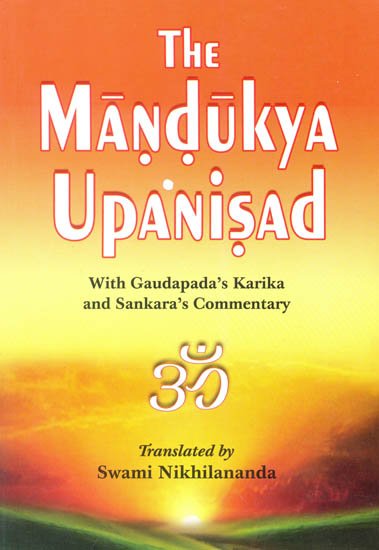Mandukya Upanishad (Gaudapa Karika and Shankara Bhashya)
by Swami Nikhilananda | 1949 | 115,575 words | ISBN-13: 9788175050228
This is verse 4.90 of the Mandukya Karika English translation, including commentaries by Gaudapada (Karika), Shankara (Bhashya) and a glossary by Anandagiri (Tika). Alternate transliteration: Māṇḍūkya-upaniṣad 4.90, Gauḍapāda Kārikā, Śaṅkara Bhāṣya, Ānandagiri Ṭīkā.
Mandukya Karika, verse 4.90
Sanskrit text, IAST transliteration and English translation
हेयज्ञेयाप्यपाक्यानि विज्ञेयान्यग्रयाणतः ।
तेषामन्यत्र विज्ञेयादुपलम्भस्त्रिषु स्मृतः ॥ ९० ॥heyajñeyāpyapākyāni vijñeyānyagrayāṇataḥ |
teṣāmanyatra vijñeyādupalambhastriṣu smṛtaḥ || 90 ||90. The four things to be known first are: the thing to be avoided, the objects to be realised, the things to be attained (by practice) and the thoughts to be rendered ineffective. Among these four, the three things, excepting what is to be realised, viz., the Supreme Reality, exist only as imaginations.
Shankara Bhashya (commentary)
There may arise a doubt that the three states of empirical experience may constitute the Ultimate Reality on account of their being pointed out1 as things to be gradually known. In order to remove this doubt it is said, the “Heyas” or things to be avoided are the three states of empirical experience, viz., the waking, the dream and the deep sleep. These do not exist in Ātman just as the snake is not present in the rope. Therefore they should be avoided. The word Jñeya, i.e., the thing to be known, in this text refers to the knowledge of the Ultimate Reality, free from the four2 alternative theories described before. The things to be acquired are the accessories of spiritual realisation, viz., wisdom,3 childlike4 innocence and silence.5 These virtues are practised by the sages after they have renounced the threefold6 desires. The word “Pākyāni” in the text signifies the latent7 impressions which in due course attain maturity, viz., such blemishes as attachment, aversion, delusion, etc. These are known as Kaṣāya or the passions that hide the real nature of the soul. As8 a means to their realisation of the Supreme Reality, sages should first of all be acquainted with these four things, viz., the thing to be avoided, the thing to be realised, the thing to be acquired and the thing to be rendered ineffective. These, however, with the exception of the thing to be known—that is to say, with the exception of the non-dual Brahman alone, the essence of the Ultimate Reality, that should be realised—are perceived9 on account of our imagination. This is the conclusion of the Knowers of Brahman with regard to the three things, viz., those to be avoided, acquired, and those that are (awaiting maturity and therefore) to be made ineffective. In other words, these three do not exist from the standpoint of the Ultimate Reality.
Anandagiri Tika (glossary)
1 Pointed out, etc.—Compare Kārikās 88 and 89 (Chapter 4).
2 Four, etc,-— Compare Kārikā 83 (Chapter 4).
3 Wisdom—This wisdom consists of the intellectual capacity to know that the non-dual Brahman alone is the objective of the Vedānta Scriptures.
4 Childlike, etc.—That is to say, freedom from egoism, vanity, etc.
5 Silence—It means that intense concentration on Brahman which makes one avoid all vain talk.
6 Threefold, etc.—That is, the desires for children, for wealth and for heavenly felicity.
7 Latent, etc.—An ignorant man cherishes many vices, such as attachment, hatred, delusion, etc. These are known in Vedānta as Kaṣāya. Among those vices, the effect of past work and thought, some are bearing fruits which are seen in our daily activities. But others are mere tendencies and latent impressions waiting for favourable conditions to manifest themselves. These latent impressions are known as “Pākyā”. These should be destroyed by discrimination.
8 As a means, etc.—The seeker after Truth should know the nature of the three things to he avoided, etc., because it helps him in his spiritual progress.
9 Are perceived—From the standpoint of the Ultimate Reality, Brahman alone exists. Duality is perceived on account of illusion. Therefore these three things are perceived to exist only on the plane of ignorance. And this is due to ignorance. On the acquisition of knowledge one understands that there is nothing to be avoided or shunned as Brahman alone exists (everywhere).
